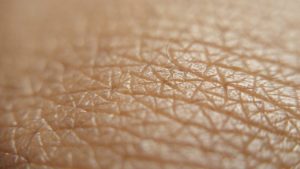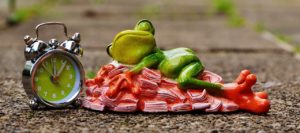Special Episode #4: Life & Blood Sugar [Show Notes]

For someone with diabetes, everything they do in life affects their blood sugar. They could be eating 100% right and taking their medicine 100% right, and something would cause the blood sugar to be off.
Exercise
It is well-accepted that exercise is good for you. Your body will store extra sugar as a large molecule called Glycogen. Imagine a line of kindergarteners hold hands trying to make it through the museum, Glycogen is just a bunch of glucoses holding hands. When you’re not eating, your body will snip off a glucose at a time as it needs it. The liver stores and directs the glycogen most of the time. Your skeletal muscles also store some glycogen, because when they do work (i.e. exercise), it takes too long for the liver to snip off glucose from glycogen and send it to them.
After exercise, the body replenishes the muscles’ glycogen stores. This can cause the blood sugar level to drop, for someone with diabetes, this can be dangerous because they can’t “untake” medicine. When protein and carbohydrates are eaten together, before or after exercise, the blood sugar changes can happen more slowly – the nutrient absorption in the gut causes a “traffic jam” of sorts.
Sleep
Certain metabolism processes happen only when you sleep. Some people with diabetes wake up with really high blood sugar, others wake up with really low blood sugar. Sleep is not restful and restorative if the blood sugar is out of balance, but also if sleep is not restful, then blood sugar levels can be jacked up – not just in the morning, but for the rest of the day.
Stress
The hormones that are triggered by stress – even something as basic as adrenaline, can cause the body to respond to insulin and glucose differently.
Sickness
Your body is going to responds things differently when the immune system is in high gear – that includes insulin, glucose, the food you eat. An infection requires an antibiotic because you are infected with a bacteria. Bacteria are living organisms. Living organisms consume energy sources and produce waste. This can affect the sugar levels in your bloodstream. You’re immune system doing work also burns sugar.
Allergies
Works about the same as sickness. Your immune system is actively trying to protect you from something (allergens) and so it responds differently.
Smoking
If you smoke, STOP! The nicotine and other chemicals make you more resistant to insulin. This is most troublesome in Type 2 Diabetes.
Hormones
Especially for women, hormone cycles can affect sensitivity to insulin differently during different times of the month. Adrenaline can override almost any response to any previous hormone response.
Life is hard
Life with diabetes is super hard. Diabetes and other chronic diseases are silent and it doesn’t show on the outside at first sight. Extend grace, extend compassion.
The Nashville chapter of JDRF is having their annual One Walk on September 24th. Friend of the show and previous guest, Rachel Mayo has been #T1D for over 10 years and she is passionate about the cutting edge research and support JDRF provides for people and their families. Her goal is for her team to raise $5000, you can contribute!
Connect with me
Support us on Patreon
*NEW* Join the Pharmacist Answers Podcast Community on Facebook
Subscribe: iTunes, Stitcher, GooglePlay, TuneIn Radio
Music Credits: “Radio Martini” Kevin MacLeod (incompetech.com) Licensed under Creative Commons: By Attribution 3.0 http://creativecommons.org/licenses/by/3.0/


